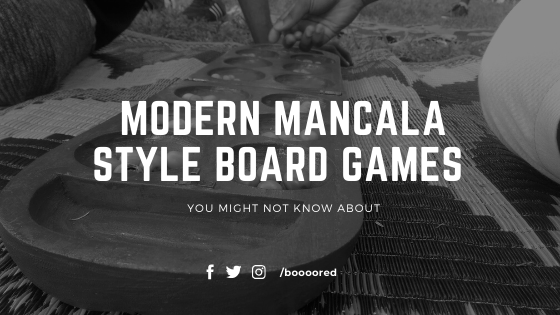The game Mancala is one of the oldest known board games in existence that is still being played by gamers today.
The game Mancala is a generic name for a family of two-player turn-based strategy board games played with small stones, beans, or seeds and rows of holes or pits in the earth, a board or other playing surface.
This game from ancient Egypt has a famous gaming Mechanic where players grab a handful of pieces from an area of the board and place a piece from there hand each time they move a space. This is used to limit the number of spaces they can move while also populating the board as they move.
This mechanism is one of the oldest around with Evidence of the game being uncovered in Israel in the city of Gedera in an excavated Roman bathhouse where pottery boards and rock cuts were unearthed dating back to between the 2nd and 3rd century AD making it one of the oldest gaming mechanics around.
In the last couple of decades, a few modern board games have taken this ancient mechanism and built on it to create some amazing board games.
Here are a few out our favourite games to do this and how they used this historic Mechanism.
Trajan
/pic4336095.png)
Set in ancient Rome, Trajan is a development game in which players try to increase their influence and power in various areas of Roman life such as political influence, trading, military dominion and other important parts of Roman culture.
The central mechanism of the game uses a system similar to that in Mancala or pit-and-pebbles games. In Trajan, a player has six possible actions: building, trading, taking tiles from the forum, using the military, influencing the Senate, and placing Trajan tiles on his tableau.
At the start of the game, each player has two differently coloured pieces in each of the six sections (bowls) of his tableau. On a turn, the player picks up all the pieces in one bowl and distributes them one-by-one in bowls in clockwise order.
Wherever the final piece is placed, the player takes the action associated with that bowl; in addition, if the coloured pieces in that bowl match the colours shown on a Trajan tile next to the bowl (with tiles being placed at the start of the game and through later actions), then the player takes the additional action shown on that tile.
Istanbul
/pic1885326.jpg)
In Istanbul, you lead a group of one merchant and four assistants through 16 locations in the bazaar. At each such location, you can carry out a specific action. The challenge, though, is that to take any action, you must move your merchant and an assistant there, then leave the assistant behind (to handle all the details while you focus on larger matters). If you want to use that assistant again later, your merchant must return to that location to pick him up.
This feels a lot like the Mancala Mechanic tho, not technically it is close enough to mention it on this list.
Fistfull of Meeples
/pic4690967.png)
This light Wild West board game is Mancala meets worker-placement in a box.
On your turn, you’ll grab a Fistful of Meeples and place them around the street. Take actions such as mining for gold, building businesses, duelling in the street, and setting off explosive jailbreaks! After the dust has settled, the player with the most points wins!
Five Tribes
/pic2055255.jpg)
Five Tribes builds on a long tradition of German-style games that feature wooden meeples. Here, in a unique twist on the now-standard “worker placement” genre, the game begins with the meeples already in place – and players must cleverly maneuver them using the Mancala Mechanic over the villages, markets, oases, and sacred places tiles that make up Naqala. How, when, and where you dis-place these Five Tribes of Assassins, Elders, Builders, Merchants, and Viziers determine your victory or failure.
Crusaders: Thy Will Be Done
/pic3187849.png)
Players will take actions, erect buildings, moving knights and go crusading to spread the influence of your Order using the Mancala Mechanic.
When the Orders get too strong, King Philip will become nervous and disband all Templar orders, ending the game.
Crusaders: Thy Will Be Done uses a combination of rondel and mancala mechanisms. Each player has their own rondel, which they can upgrade over the course of the game, that controls their action choices during the game. Your faction gives you a special power to control your rondel, and the buildings you erect will help you form a strategy.
Planes
/pic2020706.jpg)
Planes put you as the player in the role of a group attempting to push your way through a crowded airport to reach your plane before takeoff.
Other players’ families or groups, as well as neutral travellers, will cause all sorts of congestion in the terminal and may keep you from boarding.
The game plays almost identical to Mancala but also has cards that affect play and allow bonus scoring, in addition to variable airport maps.
Did we miss any games? let us know in the comments below
Readers Recommendations:

